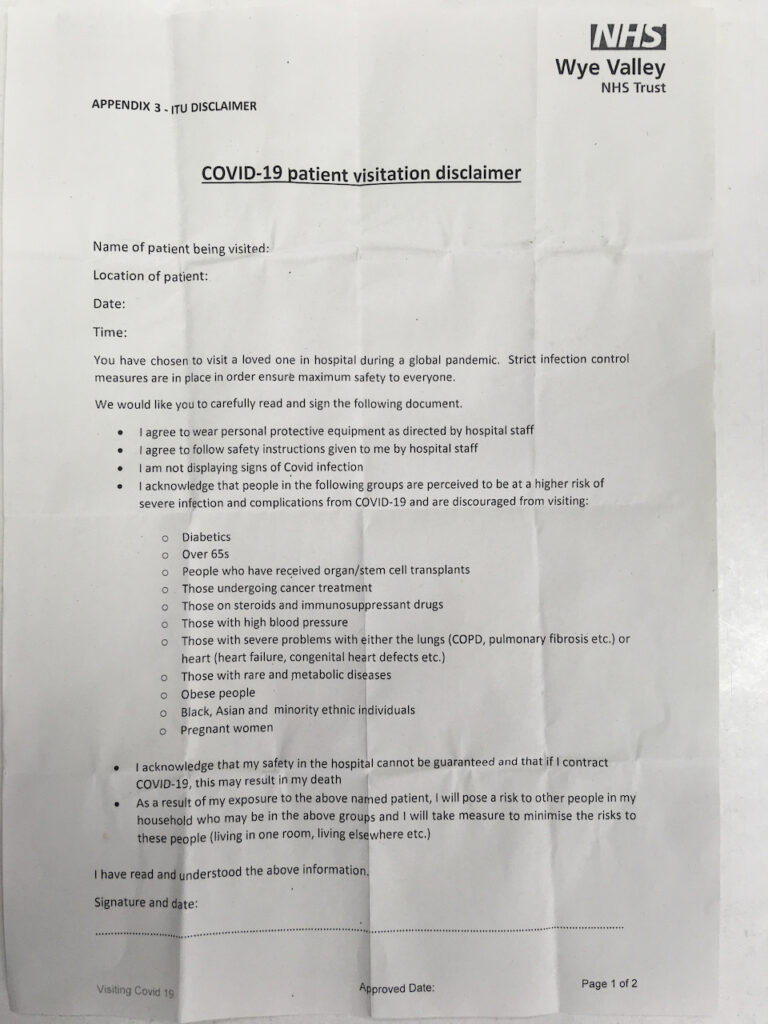An NHS hospital trust has come under fire for giving ICU visitors a form telling them that if they are “black, Asian or minority ethnic” they should not visit because they are deemed to be at higher risk of COVID-19.
The “patient visitation disclaimer” from Wye Valley NHS Trust (depicted below) also tells the over-65s, pregnant women, diabetics and obese people, among a list of 11 categories, that they are “discouraged from visiting” for safety reasons. It informs the visitor he or she has “chosen to visit a loved one in hospital during a global pandemic”, as though that is something blameable for which he or she should feel ashamed.
Visitors are expected to sign this acknowledgement that they are not welcome along with a pledge to follow all directions of hospital staff as regards masks and personal protective equipment “in order ensure [sic] maximum safety to [sic] everyone”.
Visitors further pledge that if they live with black, Asian or minority ethnic individuals, over-65s, pregnant women etc., then following their visit they will “take measure [sic] to minimise the risks” by moving out to “live elsewhere” or otherwise avoid such people, for an unspecified period of time.
While the disclaimer appears to be specifically for visitors to COVID-19 patients, the person who had been given it ahead of visiting a friend and sent it to the Daily Sceptic was visiting someone who did not have COVID-19 and had not tested positive for it, so the trust was evidently giving it to at least some visitors for non-Covid patients.
Will the NHS ever move on from the pandemic or is this to be a permanent state of affairs? Are black people, pregnant women, the over-65s etc., to be “discouraged” from visiting forever, or just for the foreseeable future?













To join in with the discussion please make a donation to The Daily Sceptic.
Profanity and abuse will be removed and may lead to a permanent ban.
Ah the universally revered NHS. That bastion of evidence-based practice, which they use to inform patient care as good clinical outcomes are always their number 1 priority.🤦♀️
They’ve now become the biggest cheer-leaders and enablers of the Covid narrative and woe betide anybody who doesn’t submit to their cult-like protocols based on superstition and dogma.
The great NHS…where science went to die. R.I.P critical thinking skills and patient care.☠👻🤡🧟♂️
My mother was in hospital for a hip replacement and contracted MRSA, she was close to death at one point. Her neighbour, a few days after an op got a blood clot and died, COV-ID is the least of our dangers when we enter an NHS hospital.
Yes, it’s amazing how MRSA – a diseases created by appalling hospital sanitation – has been forgotten. Hospitals have gone back to being the deathtraps they were 150 years ago.
I’m sorry but on this one subject, I have to resort to swearing and “sod off”. I wanted to be far stronger than that and yes I know, the minute you resort to insults, you’ve lost the argument. But in this case it’s justified.
Any attempts to restrict access to loved ones by relatives and friends must be ignored. Mum died scared and alone in hospital because of these unjustifiable restrictions. I don’t sleep as well as I used to and wake up in a cold sweat thinking that I let her down. Until all this crap, I slept like a log.
This is the continuation of scaremongering and further erosion of trust in the NHS. It’s not outright banning like with mum, but it’s getting close.
I’m going to guess private hospitals are not requiring the same?
Sorry to hear about your mum. It’s unforgivable. You didn’t let her down, the NHS did.
Covid is an excuse for the feckless and lazy and the NHS takes full advantage because they know they can do whatever they like – they are the untouchables.
So black, Asian, obese and over-65s are ‘discouraged’ from visiting loved ones.
‘Discouraged’???!!!
I’ve edited this as I’m hoping giving it to those visiting loved ones without Covid is a mistake by hospital staff.
Well just to give one example of how utterly anti-science and pro-dogma the NHS are; if they’re still mandating masks and plastic screens to separate people in waiting areas are in use then they’re still working on the notion that Covid is spread via fomite transmission, when that idea was debunked many months ago when it was discovered the virus was spread by aerosilized particles that can hang in the air long after a person has left. And I know we’ve been banging on about many other examples on here for ages which demonstrates the NHS are not data-driven with the latest evidence underpinning their protocols.
It really is shameful how they’ve completely turned their back on the science and it’s the public that pay the price. I mean, asking people to wear a visor FFS! Because that’s always been a regular thing to do every flu season but especially in sumner time!😂 The organization is just one big, diabolical joke and I can’t believe the British public have to tolerate this callous, substandard and irrational treatment. I’d rather pay through the nose for health insurance but be treat by sane individuals who don’t treat everybody like vectors of a deadly disease, despite having zero symptoms.
Surely Bozo can resurrect his BLM chums and get them to sort this out. It’s just not on.
They want to continue to inflate Covid for the COV-ID. We must never accept Medical Intervention ID, a dystopian nightmare. Where would it end, not at the Covid jab that’s for sure, they will never stop coming up with new viruses etc. to add to the list you need for your ID.
The WHO hasn’t declared the pandemic over. Hence, the NHS continues to operate in pandemic mode. In Reading, there’s a dentist in Market Place which, according to signs on the front window, still operates in full monty COVID mode, masks, distancing and all. They even wrongly claim the government would still recommend all of this in health care settings.
Corollary: Bojo is the name of a ball game where all kinds of experts standing in a circle are kicking the bojo, that is, the ball, around as it suits them while it occasionally whimpers for mercy because it claims it can’t stand it anymore.
My official ethnic designation according to the UK system for that is other white (ie, white people we don’t care about – if that’s not a racial slur, I have no idea what is), I obviously belong to a minority ethnicity. So, basically, unless someone’s a Genetically True Brit[tm], the Wye Valley NHS Trust demands that he must self-isolate perpetually after visiting a hospital. That’s obviously not enforcable. But this makes it no less outrageous because these people would enforce it if they only could.
Racial discrimination by the NHS is A-OK for as long as it only harms the general public and not NHS employees. They have a statistic to prove that they must do this.
Worthy task for whoever becomes the next PM: Stop the NHS from acting as if it was an extraterritorial WHO occupation force authorized to give general orders to the people living in the UK regardless of either UK law or UK government policy.
Not that lower vitamin D levels among “black” people make a difference or anything…
They’re just openly saying that white men are stronger.
They use the weasel words “perceived” to avoid making direct statements. “…perceived to be at higher risk…”. Perceived by who? Making health decisions on the basis of an anonymous “perception” is ridiculous. And making blanket statements about all non while people on the basis of “perception” is called “racism”.
No mention of men. Even though men are known to be at higher risk. Weird…
And this is legal?
Remind me. What’s Covid again? Oh, you mean; like “climate change” on stilts😁
The NHS is managed by morons. My sister is an NHS nurse and was shocked and sickened to the point of depression by the stupidity and its inhumane consequences that she had to contend with since 2020. That they are still doing this is literally terrifying for it indicates a mind boggling level of gross ignorance.
This is actually quite shocking. This hospital trust must surely be from another planet. They’ll be banning patients next.
This is out and out discrimination. What the hell is going on. Where are the legal experts shouting from the rooftops UK citizens are being discriminated against! Or is this just another ploy to coerce people to take the death shots. I suspect the latter. What a sorry state of affairs when the UK government run healthcare system has to LIE in order to do its job (although they have been lying for two years now, safety and efficacy of covid shots, safe for pregnant women, ventilators, midazolam, remdesivir, masks, PCR tests). Please show everyone the scientific data these discriminatory practices are based on. Until then people DO NOT COMPLY!
the NHS authors of this health advisory have not understood fundamental facts about this ‘covid pandemic’ (1) so-called ‘covid’ cannot be diagnosed clinically because there are no pathognomonic features (2) so-called ‘covid’ cannot be diagnosed by laboratory tests, in particular because the PCR test only detects nucleic acid fragments of indeterminate origin, it doesn’t detect infection (3) PCR tests are usually grossly upcycled, so an overwhelming majority of ‘positives’ are false (4) the ‘covid’ virus has never been isolated, it’s an in silico creation (5) this is not a ‘covid’ pandemic, it’s a pandemic of fraudulent PCR testing (6) for all genuine Coronaviridae, a patient must be ill to be infectious (7) masks are ineffective and dangerous, as many decades of empirical evidence and research have shown, including recent uniquely high quality large cohort randomised prospective studies conducted at West Point and in Denmark (8) coercion and shaming have no place in genuine epidemic management – Edgar Hope-Simpson emphasises this in his magnum opus ‘The Transmission of Epidemic Influenza’ (1992) (9) the Nuremberg Code remains fundamental international law which cannot be derogated.